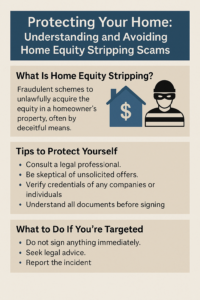
Your home is likely one of your most valuable assets. Unfortunately, you may be a target for unscrupulous. Homeowners—especially those facing financial difficulties—can be presented with deceptive schemes designed to steal the equity built up in their home. One such scheme is known as home equity stripping.
What Is Home Equity Stripping?
Home equity stripping involves fraudulent practices where individuals or companies aim to acquire the equity in a homeowner’s property without fair compensation. These schemes will offer assistance with mortgage payments or foreclosure prevention, only to strip away the homeowner’s equity through deceptive means.
For instance, a fraudster might persuade a homeowner to transfer the property title under the guise of helping them avoid foreclosure. Once the title is transferred, the scammer can sell the property or take out loans against it, leaving the original homeowner without their home or its equity.
Common Tactics Used in Equity Stripping Scams
- Unsolicited Offers of Help: Scammers may approach homeowners with unsolicited offers to “rescue” them from foreclosure or financial hardship.
- Pressure to Transfer Property Title: Homeowners might be pressured into signing over their property title, often without fully understanding the consequences.
- Promises of Lease-Back Arrangements: Scammers may promise that homeowners can remain in their homes as renters, only to evict them later.
- Complex or Incomplete Paperwork: Fraudsters often present confusing documents or omit crucial information, making it difficult for homeowners to comprehend the terms.
Tips to Protect Yourself
- Consult a Legal Professional: Before making any decisions or signing documents related to your property, consult with a qualified attorney or other professional to understand your rights and options in any documents presented to you.
- Be Sceptical of Unsolicited Offers: Approach unsolicited offers of assistance with caution, especially if they involve transferring your property title or making immediate decisions.
- Verify Credentials: Research the background of individuals or companies offering help. Check for licenses, reviews, and any complaints that have been filed online. Contact your state’s consumer protection agency.
- Understand All Documents: Just like any other document, it’s essential to fully understand all documents before signing. If something is unclear, seek clarification from a trusted professional. Don’t rely on verbal representations!
- Report Suspicious Activity: If you suspect a scam, report it to your state’s attorney general’s office, the police, or local consumer protection agency.
What to Do If You’re Targeted
If you believe an equity stripping scam is targeting you:
- Do Not Sign Anything Immediately: Take time to review any offers or documents thoroughly.
- Seek Legal Advice: Contact a professional who specializes in real estate or consumer protection law.
- Report the Incident: File a complaint with your state’s attorney general’s office and other relevant authorities to help prevent others from falling victim. File complaints online.
Additional Resources
Remember, while this information aims to provide general guidance, it’s essential to consult with a qualified legal professional to address your specific situation.
This blog post is intended for informational purposes only and does not constitute legal advice.
The information provided does not, and is not intended to, constitute legal advice; instead, all information is for general informational purposes only. This information may not constitute the most up-to-date information. Links provided are only for the convenience of the reader. A. Ferraris Law, PLLC, and its members do not endorse the contents of the third-party references.
Copyright©2025, A. Ferraris Law, PLLC. All Rights Reserved.







